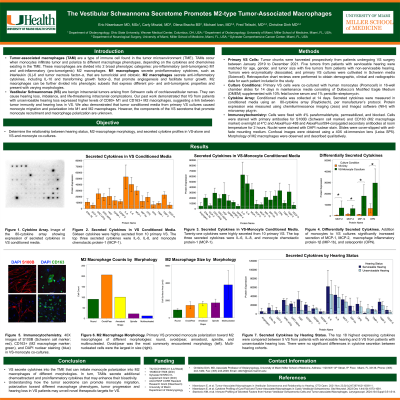Otology/Neurotology
(0943) Macrophage Differentiation and Cytokine Expression in the Vestibular Schwannoma Microenvironment
Monday, September 30, 2024
12:00 PM - 1:00 PM EDT

Disclosure(s):
Eric Nisenbaum, MD, MSc: No relevant relationships to disclose.
Christine T. Dinh, MD: No relevant relationships to disclose.
Introduction: Vestibular schwannoma (VS) may secrete distinct cytokines and recruit specific immune cells, such as M2 macrophages, that contribute to tumor growth and hearing loss. To investigate these associations, we characterized (1) the secreted cytokine profiles of cultured VS alone and in co-culture with monocytes, and (2) M2 macrophage expression, morphology, and cytokine profiles from VS patients with serviceable and unserviceable hearing.
Methods: VS tumors were harvested prospectively from patients undergoing resection from 2019 to 2021. Five tumors from patients with serviceable hearing were matched for age, gender, and tumor size with five from patients with non-serviceable hearing. Tumors were cultured for 14 days alone and in co-culture with human monocytes. Immunocytochemistry (ICC) for S100B (Schwann cell marker) and CD163 (M2 macrophage marker) was performed, and macrophage number and morphology were analyzed. Tumor conditioned media was collected and analyzed using an 88-cytokine antibody array. Retrospective chart review was performed to obtain demographic, clinical, and radiographic data.
Results: Primary VS secrete several cytokines, most prominently IL-6, IL-8, and MCP-1. VS co-cultured with undifferentiated monocytes express significantly more MCP-2 and 3, MIP-1b, and osteopontin compared to VS cultures alone. Osteopontin was expressed at significantly higher levels in VS from patients with unserviceable hearing, compared to serviceable hearing. ICC showed monocyte differentiation into M2 macrophages of different morphologies at varying degrees.
Conclusions: Primary VS secrete distinct cytokines that can polarize undifferentiated monocytes to become CD163+ M2 macrophages and initiate the secretion of additional pro-inflammatory cytokines that may affect hearing and tumor growth. Primary VS from patients with unserviceable hearing secreted higher levels of osteopontin, suggesting a role for this cytokine in promoting hearing loss. Understanding the tumor microenvironment in VS may lead to novel targets and therapies for hearing loss related to VS.

Eric Nisenbaum, MD, MSc
Resident
University of Miami
Miami, Florida, United States- CD
Christine T. Dinh, MD
Associate Professor of Otolaryngology
University of Miami
Miami, FL, United States
